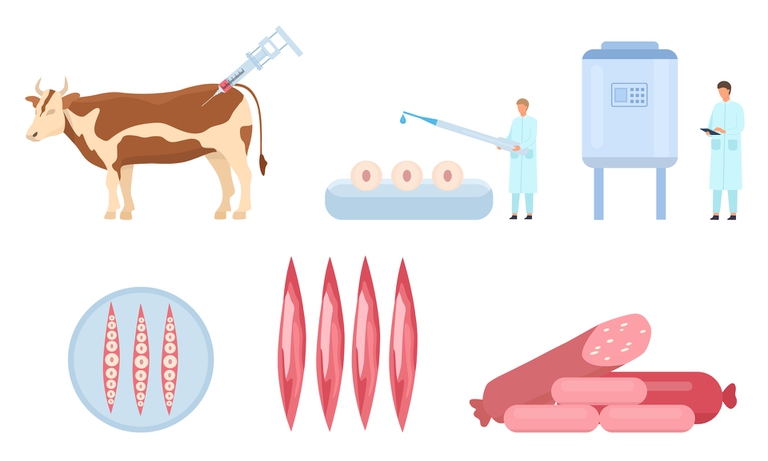https://www.lifegate.it/carne-coltivata-falsa-soluzione
- |
Do you remember when in recent months and years there was great emphasis on the impact of industrial agriculture on the soil, on aquifers, on the air and finally on climate change?Do you remember the citizens' protests against the massive and senseless use of pesticides and chemical fertilizers responsible for the current environmental contamination?It was said:“we are earth”, we must change the production paradigm before bringing the planet to collapse.Faced with the evidence of the damage and the positive experimentation of agroecological alternatives, with the voices and mobilizations coming from threatened and sick territories, some political initiatives were welcomed with renewed hope.Among these, the European Commission's strategies for the conservation of biodiversity, the objective of increasing the surface area under organic cultivation and the gradual reduction of the use of synthetic chemical pesticides in agriculture.

Well, have you ever wondered what the hybrid seed industry was doing gmo and biotechnology, agrotoxics, while environmentalists, consumers and organic producers tried to organize new, shorter, anti-waste ecological supply chains that could also revive local economies?The correct answer is the one you are thinking of:the industry was making calculations of how much a scenario of this type could have a catastrophically negative impact on its balance sheets and dividends.
Because the industry invests in laboratory-grown meat and new GMOs
How to survive the ecological tsunami?Defending the old production paradigm made no sense.Of course, millions of euros could still be spent on lobbying for the reauthorization of glyphosate in Europe, but what next?New proposals, new solutions were needed. New ideas to keep positions of power, control and profit unchanged.The directions along which agritech has decided to move are essentially two:that of second generation of GMOs and that of artificial meat.Both solutions are perfect because they involve patents, market control, profits and, above all, they fit perfectly into the green narrative, in other words to unscrupulous greenwashing initiatives.
The Italian case caused a sensation because, ante litteram, the government wanted to move on both issues ahead of Europe, perhaps to gain a sort of Italian primacy which is always good for propaganda purposes.However, haste is not a good advisor and so while the bass drum of the precautionary principle and the protection of Italian productions was thundering, slamming the door in the face of meat created in the laboratory, the window was opened to let the other great enter the country threat to our food sovereignty:second generation GMOs.A true logical, political and ideological paradox.

Because it's not the solution
The hasty resort to the laboratory-created meat business will not save the planet but it will save the agritech industry which risked losing important market shares.At the basis of this market solution there is not an ecological vision that involves a discussion on soil regeneration, the protection of water resources, the food sovereignty of communities but rather a simple marketing equation:Are more and more consumers sensitive to the deplorable conditions of intensive farming?No problem, just produce fake meat. Frankenstein food, as was said in the case of GMOs.
Those who raise doubts about artificial meat often refer to the precautionary principle.The precaution in this case would concern particular attention to the production processes behind the placing on the market of the product, the health and nutritional ones.In fact, it must be kept in mind that trying to recompose a food that exists in nature, with the aim of simulating all its natural characteristics, is not a trivial or risk-free operation, as underlined by a recent FAO report about it.
Who will decide to trust the investors themselves and of the same industrial conglomerates that for decades have told us that i pesticides were not harmful to the environment and human health will be free to do so.Who feeds on junk food, which supermarket shelves are full of, perhaps you won't ask too many questions about new types of technological foods, which will probably contain a long series of artificial additives in order to make them more attractive.

There are other alternatives to the model that led to our collapse
But leaving aside these considerations, one of the greatest risks that the narrative on laboratory-grown meat entails is that it diverts attention from real alternatives.Those that are developing, today, bottom up from the territories, in a participatory, conscious way and with the enthusiasm of those who know that they are truly doing the right thing and the beautiful thing.The solution of meat grown in the laboratory, an up-down solution imposed on us by the industry, risks ruining this above all, appealing precisely to those citizens who are attentive to the environment and increasingly critical of industrial food production.To do this, the industry has created a false dichotomy between cultured meat and factory farming.This is the choice that the industry offers us.The real world is something else!And we are truly free to choose between various options, and not just those offered by the industry.
Agroecology, agriculture and organic farming of small scale, the role of farmers and shepherds as guardians of our landscapes, of our land, the development of circular economies and short supply chains they not only regenerate the earth but also the social and economic fabrics.By encouraging the illusion of being able to live outside of nature's ecological processes, the artificial meat business will do nothing but increase multinational control over food and health, accelerate the collapse of local food economies and further destroy food democracy.The real solution to the environmental and health crisis is based on an active path of regeneration of the planet, collaborating with ecological processes through agroecological and regenerative practices.
